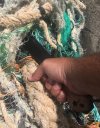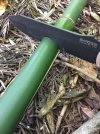I tried cutting a piece of old maritime rope that has been sitting on the shoreline for years, it's a thick braided synthetic made up of four smaller strands, and it didn't go well. I tried various knives with various steels and edges from polished to coarse and all struggled, none were able to make a clean cut, all lost their edge quickly. Is that type of rope that tough? Does being weathered and exposed to saltwater make it tougher to cut? Seeing my sharp knives fail at such a task was surprising and disappointing.
-
The BladeForums.com 2024 Traditional Knife is ready to order! See this thread for details: https://www.bladeforums.com/threads/bladeforums-2024-traditional-knife.2003187/
Price is $300 ea (shipped within CONUS). If you live outside the US, I will contact you after your order for extra shipping charges.
Order here: https://www.bladeforums.com/help/2024-traditional/ - Order as many as you like, we have plenty.
You are using an out of date browser. It may not display this or other websites correctly.
You should upgrade or use an alternative browser.
You should upgrade or use an alternative browser.
Issues cutting rope
- Thread starter P_A_S_1
- Start date
- Joined
- Jul 5, 2014
- Messages
- 3,523
Big ropes whether natural or synthetic fibre will benefit from using a serrated blade. As mentioned, this rope is probably impregnated with all sorts of fine grit, sand, shell etc particles that will quickly dull an edge.
I wouldn't be too disconcerted or lose any faith in your knife, there are some things that will dull even an 'unobtanium' steel.
I wouldn't be too disconcerted or lose any faith in your knife, there are some things that will dull even an 'unobtanium' steel.
- Joined
- Sep 13, 2017
- Messages
- 9,047
Rope is easy to cut with any sharp knife ashore or on a boat. The more dry and stable (position) the better.Contrary view here. I often cut old dirty ropes in my trade, and find a sharp plain blade safer and faster than serrated. No way around the edge wear.
Have you ever tried to cut old rope 80 ft down underwater?
- Joined
- Sep 13, 2017
- Messages
- 9,047
You make a good point. I have not cut much underwater diving, but I can see where serrations would indeed be a benefit.Rope is easy to cut with any sharp knife ashore or on a boat. The more dry and stable (position) the better.
Have you ever tried to cut old rope 80 ft down underwater?
What often happens with old rope underwater is that (1) it can be hard to keep in position, and (2) a layer of marine algae can form on the surface.You make a good point. I have not cut much underwater diving, but I can see where serrations would indeed be a benefit.
So what happens is that you are trying to cut an unstable (non-stationary) medium that is very slippery. The "teeth" of a serrated blade cuts through this and catches the rope surface quicker and easier than a straight blade. Depending on where you're diving the visibilty may also be limited while cutting the rope, amd of course on scuba your time underwater is limited so you want to get the job done quickly.
Any non-diver can test this by taking two similar knives, one straight blade and one serrarted. Go to the nearest water and test cut twigs/branches that have been in the water for some time. Enough to get soaked and flexible and with an algae coating. Straight blades have a hard time with this and take longer because they "cut" whereas serrated ones "rip".
Last edited:
- Joined
- Jul 20, 2021
- Messages
- 9,907
Just use a big axe...
Too much crap in an old rope. It'll dull ANY knife!
Too much crap in an old rope. It'll dull ANY knife!
Last edited:
donnord
Gold Member
- Joined
- Dec 22, 2007
- Messages
- 298
This the answer,It probably has all sorts of sand and grit impregnated in the fibres which would dull any knife.
Was cutting some moondust impregnated rope with a couple of buddies during a job detail. I had a razor sharp 1095* zip through two sections before the edge was dulled to near uselessness: Had to resort to using the point of my knife to pierce the material. After the job was done, a buddy requested I sharpen his Gerber automatic* that was made with a more modern PM steel. It was about as dull as my plain carbon steel knife. The lesson I learned was that perhaps serrations or sawbacks would have been more appropriate for the task.
*M7 mfg. by Imperial. I'm assuming the material is 1095.
**It wasn't the 06, had an American tanto profile, blade steel was either 154CM or S30V.
*M7 mfg. by Imperial. I'm assuming the material is 1095.
**It wasn't the 06, had an American tanto profile, blade steel was either 154CM or S30V.
Completely dry.Was that piece of rope completely dry? Or moist/wet?
The main reason why most Dive Knives have serrations.
That thick rope looks like what I was cutting. Interesting you had no issues.I use a BK-9 to clean shorelines. Works great.
Thanks for all the responses, the rope was pretty grungy. I also put an acute edge on all my knives, maybe a more obtuse edge would have done better.
- Joined
- Feb 1, 2018
- Messages
- 1,668
If you put a highly refined almost polished edge on your knives, that would also be a reason they didn't cut the rope as well. A rougher toothier edge would catch and dig into the rope much better than a super fine razor edge for many of the reasons people mentioned above.
Either way, old synthetic maritime rope is an absolute bear to cut.
Either way, old synthetic maritime rope is an absolute bear to cut.
Nature Boy
Gold Member
- Joined
- Jan 15, 2016
- Messages
- 2,622
Baton it next time.
So I took one of the knives after it dulled out and sharpened it with a coarse crystolon and it tore 1/2 way through very well, then it stopped like the others. I also tried a serrated spyderco that also did well initially but couldn't make it through without slowing down and having to saw like crazy to get it done with rope fibers everywhere. Looking at the serrations afterwards they're glinted/rolled.If you put a highly refined almost polished edge on your knives, that would also be a reason they didn't cut the rope as well. A rougher toothier edge would catch and dig into the rope much better than a super fine razor edge for many of the reasons people mentioned above.
Either way, old synthetic maritime rope is an absolute bear to cut.



